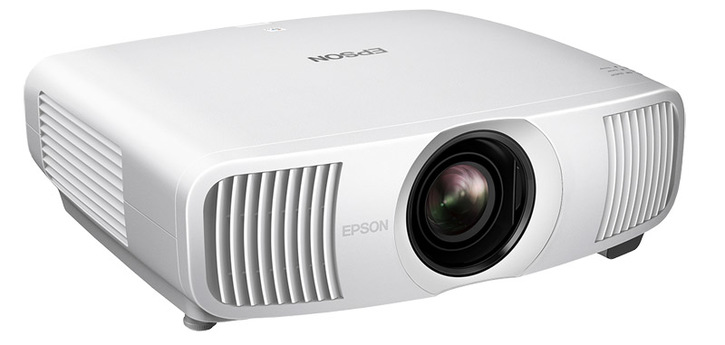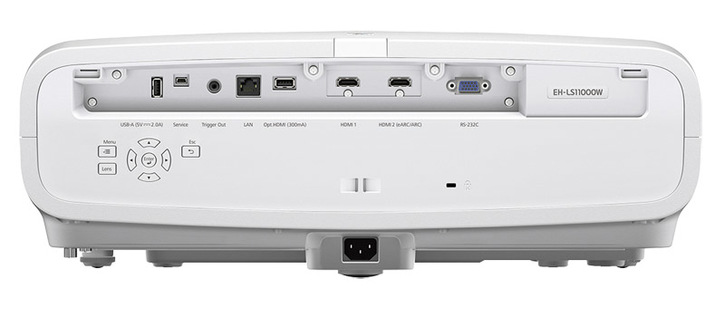We've been fans of Epson's home theater projectors for years -- bright images, nicely saturated colors and excellent contrast -- most of what you look for in a projector. Their ProCinema 4050 is our current reference. When we heard the company was releasing a relatively affordable home theater projector with true 4K resolution, we were intrigued.
Shifting the Pixels
Previous projectors from Epson have used "pixel shifting" technology to effectively double the visible resolution of a Full HD 1080p imaging chip. And while these projectors accept a full 4K input signal, two times the resolution of 1080p is still only half the resolution of 4K. So technically, we weren't seeing the full detail of 4K sources. These projectors were referred to by Epson as "4Ke" (4K enhanced) and by critics as "4K? Ehhh..." Don't get me wrong: these 4Ke projectors produce extremely high quality images, but purists want to feel like they're seeing all the juicy details.
Earlier this spring, Epson unveiled the Home Cinema LS11000 Projector ($3,999). While it still uses three native 1080p LCD chips to generate its image, the LS11000's faster, more powerful on-board processor uses higher speed pixel shifting to generate a true UHD 4K image (3840 x 2160 pixels). Epson calls this "4K PRO-UHD quad-phase, dual-axis pixel shift technology." That's a mouthful. And yes, Virginia, it is "true 4K." Every one of the 8.2 million+ pixels in a 4K UHD source is represented on screen. And the resolution isn't the only improvement.
More Than Just "More Pixels"
The LS11000 ditches the traditional projector lamp for a powerful laser-based light source. The projector uses a blue laser array combined with a fixed yellow phosphor element in order to create pure white light. That light is then distributed through an optical assembly to three 0.74-inch LCD imaging chips: one for each primary color (red, green, blue). Using three separate imaging chips eliminates the need for a color wheel, which then eliminates the so-called "rainbow effect" that plagues single-chip DLP projectors. The LS11000 is rated at a max brightness of 2,500 ANSI lumens (color and white), and Epson claims the laser should provide up to 20,000 hours of usable life.

Gaming the System
The Home Cinema LS11000 is built with the latest gaming consoles in mind, with support for 4K HDR content at 120 Hz with an input lag below 20 milliseconds. Its HDMI 2.1 inputs can handle the full 48 Gbps bandwidth for uncompressed 4K HDR content, as well as offering full support for ARC (Audio Return Channel) and eARC (enhanced Audio Return Channel). This means you could use the LS11000 with a soundbar: one with an eARC compatible HDMI input. Of course, we'd recommend using an A/V receiver and separate speakers for big sound to match that big picture.
Zoom Zoom
One of the things we like most about Epson's home theater projectors is the powerful motorized zoom lens with a wide range of lens shift and custom zoom memories. The lens shift simplifies installation: even if you have to place the projector a bit off center, on a shelf, right up against the ceiling or near the floor, the LS11000 can create a geometrically perfect image without the need for detail-robbing digital keystone correction. The lens shift spec is +/- 96% horizontally and up to +/- 47% vertically. So that's just about a full screen height of adjustment up and down and half a screen width left or right.
The zoom memory feature allows you to use the projector with a CinemaScope ultrawide screen without the requirement for a costly anamorphic lens. We have a 2.35:1 screen installed with the Epson 4050 and when a widescreen movie comes on, we can fill the entire screen at the touch of a button (eliminating those annoying black letterbox bars). The LS11000 includes this lens memory capability.
About the only thing we were not excited to hear about on the LS11000 is the lack of 3D support. I still have a decent-sized collection of Blu-ray 3D Discs (from back when that was a thing). While 3D on a 65-inch flat panel TV is not particularly impressive, once you blow the image up to 120 inches or more, good 3D content can really suck you in. The Blu-ray 3D disc of "Avatar" is still one of my favorite things to watch on our Epson projector. But, to be fair, 3D content at home is becoming more and more scarce. The 4K UltraHD Blu-ray format has no provision for 3D content. And some of the newer 4K UHD Blu-ray Disc players don't even support playback of Blu-ray 3D Discs. But I'm hoping Epson adds 3D support at some point to their laser-powered true 4K projectors.
Testing... Testing
So the numbers and specs look good. How does it perform in the real world? Our friend Geoffrey Morrison over at CNET recently reviewed the LS11000 and found a lot to like. You can check out his full review here.
While many manufacturers exaggerate their brightness ratings (in some cases by an order of magnitude), Epson prides itself on projectors that are bright both for pure white light and for color output. In Geoff's tests, the LS11000 peaked at about 1900 Lumens in its Dynamic mode and at about 1400 in "Bright Cinema" mode. Considering that most projectors are installed in light-controlled environments, these are very respectable numbers.

In terms of measured contrast, the LS11000 apparently didn't quite match its less expensive sibling the ProCinema 5050. But Geoff felt that the LS11000's dynamic contrast more than made up for this with real world content. Compared to a similarly spec'ed DLP projector, Geoff found the contrast noticeably superior.
The improved pixel shifting technology in the LS11000 is apparently having the intended effect as visible detail was noticeably better on the LS11000 vs. the earlier Epson model. Like us, Geoff appreciated the LS11000's wide range of lens shift and custom zoom memory which allows the projector to be used in Constant Image Height (CIH) applications.
Overall, Geoff concluded that the LS11000 was a bit better performer overall than both competitive models that he compared it to. And if you consider the lower cost of ownership (and greater reliability) that comes with the laser light source, the LS11000 gets a solid recommendation.
M. David Stone from PCMag also tested the LS11000 in the labs and praised its excellent out of the box color accuracy, bright dynamic image and highly flexible motorized zoom lens. Mr. Stone reminded potential owners that the LS11000 does include a motion smoothing feature which is enabled by default. But those who are bothered by the so-called "soap opera effect" while watching film-based material can easily disable that processing. Like Morrison, Stone recommends the LS11000, particularly for bright room installations. You can check out his full review here.
Turn-Ons:
Turn-Offs:
The Bottom Line
If you're shopping for a full 4K UHD projector with support for HDR, HDR10+ and HLG, with solid performance and a low long-term cost of ownership, the Epson LS11000 is definitely worth a look.
Where to Buy:
| Overall | |
|---|---|
| Value | |
| Performance | |
| Features/Ergonomics |